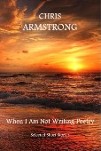The twenty-sixth story in my collection, When I Am Not Writing Poetry, is longer than most you have read so far – ‘The Endless Border’ is a story of two men trying to escape from their daily life: from, perhaps, the world of Covid: searching for life beyond. A journey made by two friends into the unknown. And I wanted to use their contrapuntal conversations – a little like Beckett’s Mercier & Camier as a means of adding a further dimension to the story. At the same time it was to be a journey of discovery, and John Bunyan’s The Pilgrim’s Progress [from This World], to That Which Is to Come came to my mind.
As a poet I was also interested in experimenting with the text on the page. I was aware that the Russian poet Osip Mandelstam had written of The Inferno and especially the Purgatorio as “glorifying the human gait, the measure and rhythm of walking, . . . In Dante philosophy and poetry are forever on the move, forever on their feet” and I wanted my text to move along at a slow walking pace and for the conversations to be at the same leisurely pace. Both inconsequential and significant, casual yet intrinsic, in time and timely. So I inserted spaces into the text to slow the reader down! Seamus Heaney wrote of stepping stones – those “stations of the soul” – that venturing out on them into the middle of a fast running stream left you on your own, at once giddy and rooted to the spot, moving yet stationary, and I saw my little pieces of text as the stepping stones on our journey: we were never quite still yet we balanced on our path, pausing, walking, stopping, ambling aimlessly yet crossing a divide.
When the two men met again, he couldn’t help himself and, despite social distancing, he clasped his friend to his chest. He hadn’t realised how worried he had been, the last message from him had been so vague… and then the silence… for ten days. And there was the lack of reply to his message. What was going on? It wasn’t like Edward, and Jonathon had been concerned for him, really concerned—was he ill? Or perhaps a member of his family? It didn’t bear thinking of, but of course, he did. His mind ran through all the dreadful possibilities. This was what seven months of isolation and lock down did to you, he thought: it left you fearing the worst at any excuse. They had been close—almost inseparable—friends for so long, but this time last year, in those lazy, sunny, pre-Covid days he would never have taken ten days silence as a harbinger of doom. They had known each other, been close, for so many years since they began working together and he realised that, in retirement, the absence of work seemed to have brought them even closer. They met because they wanted to! Initially, all those years ago, their daily meetings had been because of the work, and then, work had almost become incidental to the daily chats, the coffees… the companionship. I don’t suppose I have ever been as close to anyone he thought. It occurred to him that they had been together for more years than he had been married to his wife, and he thought that was strange. There was such a bond. A close bond. And he knew Edward felt it too.
And now, seeing him in the doorway—still with his coat on and looking slightly surprised by the close contact—brought tears to his eyes: he looked so thin… and worried. We have to get away, he thought…
‘The Endless Border’ can be found in When I Am Not Writing Poetry – available here or on Amazon.
